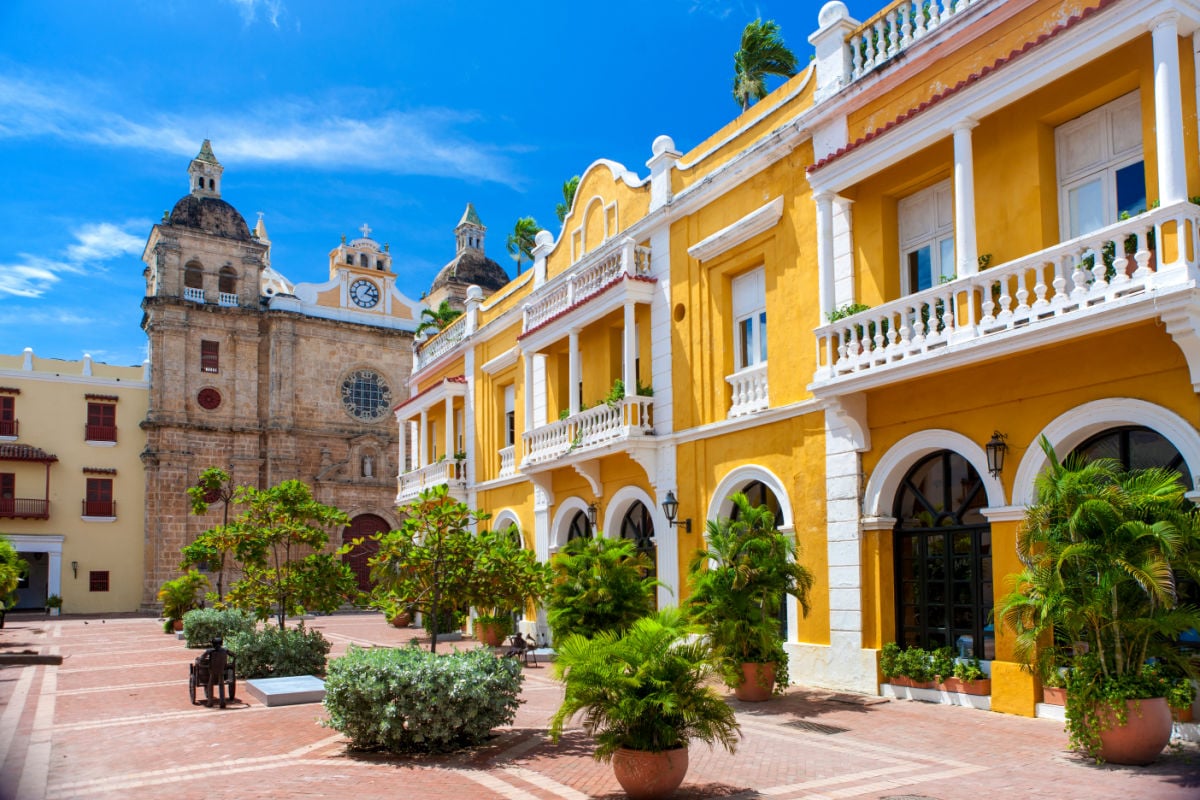[ad_1]
Last Updated
Colombia continues to draw in travelers from around the world despite the recent downpour of news headlines on Colombia’s ongoing security struggles.
Our team has frequently reported on the ground, including going behind the scenes in Medellin to discover the truth behind all the media chatter. Long story short, it’s complicated: Travelers certainly do face real-world risks when visiting Colombia, though it’s also certainly possible to stay safe while exploring the best that this wonderful country has to offer.
Here are 7 critical ways to stay safe while making your way through Colombia.

First, Some Personal Context
I recently had the great fortune of visiting Colombia this month. I spent most of my time in Santa Marta, a beautiful coastal city that’s actually (as of now) flying under the radar of most international travelers. I’m not sure whether or not this helps or hurts the local security situation: Some travel bloggers have suffered frightening crimes during their Santa Marta trips, while others (including myself) have enjoyed smooth, crime-free trips.
I had a great time exploring the lively streets and beautiful beaches of Santa Marta. The locals were incredibly warm and friendly, and I had plenty of fun while exploring the town and playing at the beach. From the Malecón to the museum, I got to do a lot, and I never sensed myself falling into any dangerous situation.
At the same time, I moved carefully. I tried my best to avoid becoming an open target, especially when I was traveling outside secured premises. I constantly did my best to be proactive in managing my risk and looking out for myself.
You can probably also stay safe while enjoying your stay in Colombia. In order to do so, try these tips for a safer trip.

Listen To the Locals!
Above all else, please remember this. Colombian locals are the preeminent experts, so listen when they give you advice.
Again, most Colombian people tend to be friendly. When they warn you that certain streets in the city that you’re visiting are particularly dangerous at night, don’t plan on frequenting the bars on that street after sunset. When they clue you in on which restaurants have good food that won’t give you the runs, frequent one of those places. When they let you know which hotels and hostels are the safest in town, consider booking your room there.
At your hotel, hostel, or inn, feel free to ask staff for tips on where to go, what to do, and how to stay safe in the neighborhood. They’re nearly always happy to help, and they tend to feel quite responsible for your safety.
With all of this said, I will add this one caveat: Don’t just trust anyone. Don’t plan on buying anything that anyone on the street is selling. If you know people who know Colombia, trust them first. If not, then book a trustworthy tour guide or ask hotel/hostel staff for help before you ask any randos who may or may not have ulterior motives.
Top 5 Travel Insurance Plans For 2023 Starting At $10 Per Week
Easily Earn Points For Free Travel

No Dar Papaya
Literally, this means, “No giving papaya.” In practical terms, this is Colombian locals’ advice for preempting robberies.
Throughout the world, many international travelers tend to “flash that cash” in public by openly displaying their smartphones, cameras, jewelry, credit cards, designer clothing and accessories, and other valuable items as they move around town.
As much as you might want to go viral on social media for your “drip,” it’s just not worth it. Though you don’t want to go out looking sloppy, you also shouldn’t go out on the town with attire that practically screams, “I’m a rich foreign tourist!”
Instead of flashing any “sweet papaya” in public, keep your valuables safely stored away unless there’s something you absolutely need on hand. And in that case, don’t keep your phone out for extended periods. Even if you sense you’re on a safe public street, don’t pull out your phone unless it’s absolutely necessary. If possible, consider buying a second phone that you won’t shed any tears over if you lose it.

Watch Your Drinks (and Dates)
Sadly, one increasingly frequent crime is the “drug and mug,” where the perpetrator gives the victim scopolamine, or “Devil’s Breath,” without their knowledge. This is most often the weapon of choice for experienced thieves who want to steal whatever they can while ensuring that victims remember nothing.
Though travel journalists often pay close attention to potential threats to femme and female solo travelers, single men and other travelers are especially at risk here. Last year, U.S. national Paul Nguyen died from a scopolamine overdose, and he wasn’t even the intended target. Even if you think you can outsmart any “drug and mug” attempt, it’s simply not something you want to leave to chance.
If you plan on enjoying some nighttime bar crawls during your Colombia trip, please pay close attention to your beverages and consider going with a group of people you can trust. Whatever you do, do not leave your drinks or your belongings unattended!
While I don’t personally like to do this while traveling, if you insist on using hookup apps like Tinder, Grindr, and Bumble during your Colombia trip, please be extra careful in screening your potential matches and in selecting safe spaces in advance to meet in person.

Watch Out with the Street Food
As much as many of us love to enjoy some tasty street food, just because it’s sold on the street doesn’t mean it’s safe for you to eat.
In general, fresh fruit juices and pastries (like arepas) tend to be safe, while meat dishes (particularly, the street sausages), many fish dishes, and bolis (or flavored sugar water) are the riskiest street fare to buy and try. But really, food quality can vary, depending on where you’re traveling and which vendors are selling on the street at any given time.
If you remember nothing else regarding street food, please remember this: Unless someone with extensive local knowledge can personally guarantee that a specific street vendor serves clean and safe food, then don’t eat it.

Stay Calm When You See Troops on the Streets
I understand that it can be quite jarring for most Westerners to see armed troops patrolling city streets. But in Colombia, this is becoming increasingly commonplace.
During my trip to Santa Marta, I regularly spotted armed troops policing the city. Even at landmarks like the Quinta de San Pedro Alejandrino estate, they made their presence known. At the Malecón downtown, they were particularly noticeable.
Though we can discuss whether or not it’s sound public policy for armed troops to perform police duties in civilian communities, the fact of the matter is that it’s already been happening in Colombia, and you need to prepare in case you see them patrolling the streets you’re on.
When I encountered these troops, I did my best to stay calm and mind my own business. As long as you’re not trying to look menacing, the troops/police probably won’t stop and interrogate you.

Be Smart with Where You Stay
As we discussed earlier, it helps to pay close attention to locals’ advice on where to stay. When that’s not possible, make sure to do your homework when selecting your accommodation.
Fortunately for me, I stayed at a hotel in an actively guarded community. It certainly helped my peace of mind, and I never noticed any incidents while staying there.
With that said, you don’t have to break the bank to stay safe. In fact, you can find plenty of hostels and other affordable lodgings throughout Colombia that will keep you safe.
Basically, it’s always good practice to check in advance and make sure the lodging you’re considering is a safe place to stay before you book your stay.

If the Worst-case Scenario Becomes Reality, Contact Your Embassy
There are reasons why the U.S. State Department and other foreign embassies post their contact information and recommend that travelers reach out whenever in need. If you end up in a dangerous situation and you need immediate assistance, your home country’s embassy is there to help.
If your passport gets lost or stolen, your embassy can help you get a replacement and get home safely. (This is why it’s always a good idea to print copies and/or store photos of your passport in the digital cloud in advance.) Even if you’re reporting a crime to the local police, you can also contact your country’s embassy and see how they can help.
I hope all of this helps you stay safe, and I really hope you now feel better about booking your next trip to Colombia. It’s absolutely a great country to visit. As long as you take some simple precautions, it’s possible to prevent your dream trip from becoming your worst nightmare.
Read More:
Top 5 Travel Insurance Plans Starting At $10 Per Week
How To Easily Earn Points For Free Travel
↓ Join Our Community ↓
The Out Of Town Blogs Community FB group has all the latest reopening news, conversations, and Q&A’s happening daily!

SUBSCRIBE TO OUR LATEST POSTS
Enter your email address to subscribe to Out Of Town Blogs’s latest breaking travel news, straight to your inbox.
This article originally appeared on outoftownblogs.com
Opinions expressed here are the author’s alone, not those of any bank, credit card issuer, hotel, airline, or other entity. This content has not been reviewed, approved or otherwise endorsed by any of the entities included within the post.
[ad_2]
